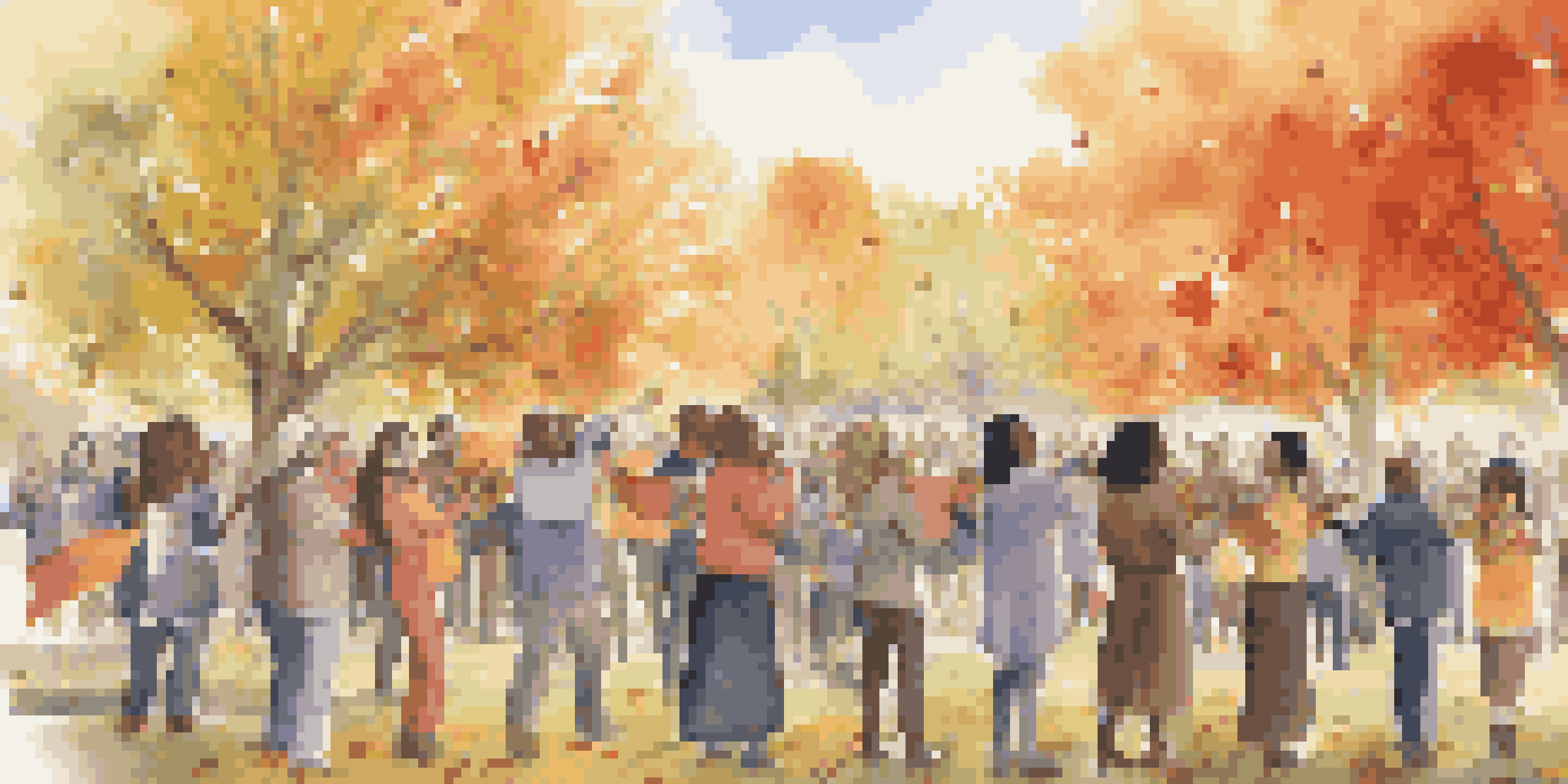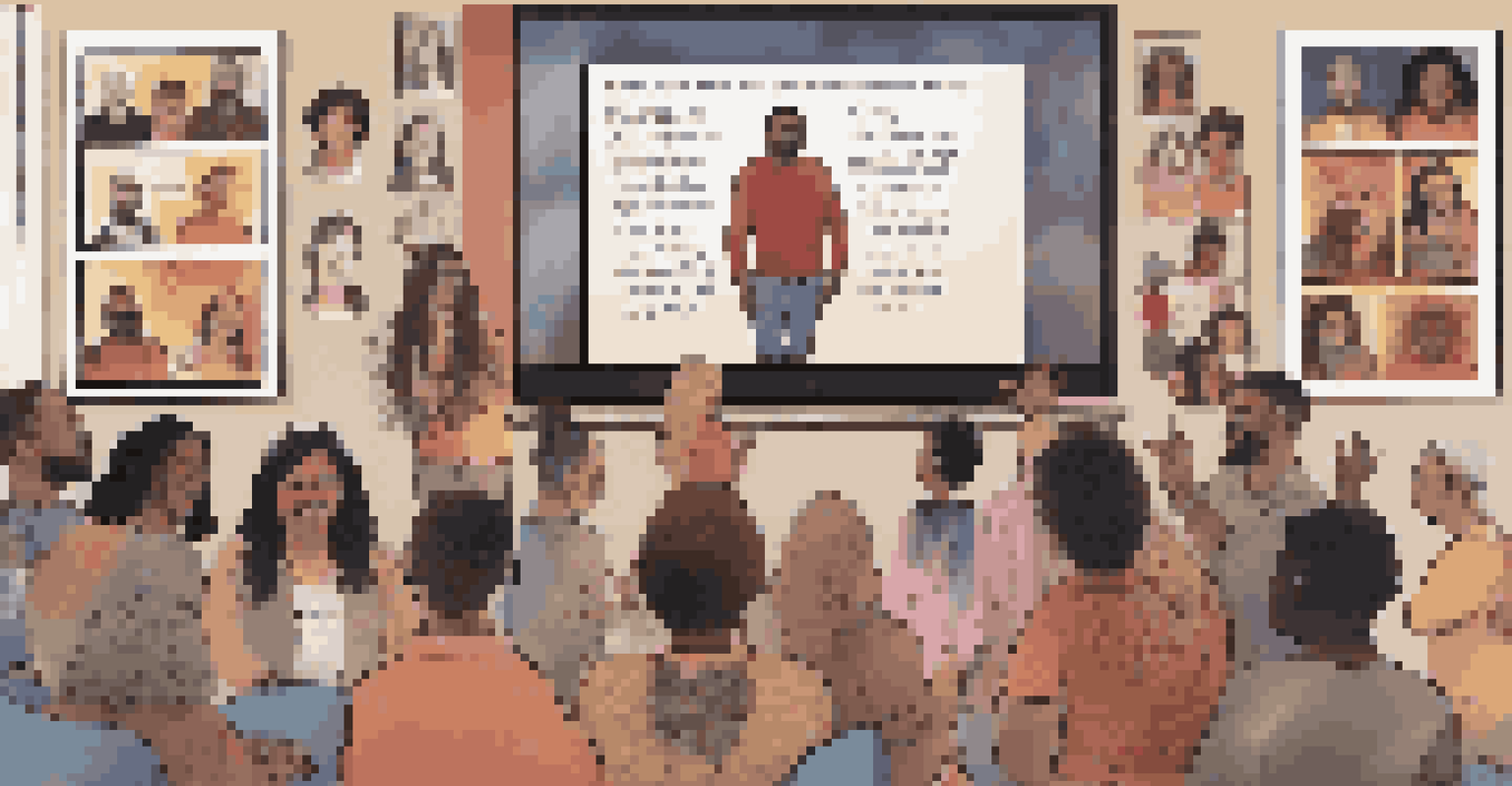Choral Music and Social Justice: A Powerful Voice

The Historical Role of Choral Music in Social Movements
Choral music has long been intertwined with social movements, serving as a powerful tool for expression and unity. From the Civil Rights Movement in the United States to anti-apartheid efforts in South Africa, choirs have often sung songs of hope and resilience. These musical gatherings create a sense of community and shared purpose, making the message resonate even more deeply.
Music can change the world because it can change people.
For instance, songs like 'We Shall Overcome' became anthems for change, rallying individuals together and fueling their spirits. The emotional weight of collective singing can amplify the call for justice, making it not just a message but a shared experience. This historical context shows that choirs have not only entertained but also inspired action and solidarity.
By understanding this legacy, we can appreciate how choral music serves as a platform to voice concerns and mobilize communities. The power of harmony can transcend barriers, making it a vital aspect of social justice efforts today. This rich tradition continues to evolve, showing that music remains a relevant force in advocating for change.
Choral Works Addressing Contemporary Social Issues
Today's choral compositions often directly engage with pressing social justice issues, from racial equality to climate change. Composers are increasingly writing pieces that reflect current events, inviting singers and audiences to reflect on their role in these pressing matters. This modern repertoire not only entertains but also educates, sparking conversations that might otherwise remain unaddressed.

For example, works like 'The World Beloved: A Bluegrass Mass' by Carol Barnett blend traditional choral elements with contemporary themes, challenging singers and listeners alike to consider their relationship with the world. Such pieces can serve as catalysts for discussions, urging communities to come together to advocate for change. Through the lens of music, complex societal issues are made more accessible and relatable.
Choral Music Fuels Social Movements
Throughout history, choral music has served as a unifying force in social movements, amplifying messages of hope and resilience.
Moreover, choirs often perform these works in collaboration with social justice organizations, further bridging the gap between art and activism. This partnership enhances the impact of both the music and the message, uniting people around common goals. The fusion of choral music with social issues exemplifies how art can be a driving force for awareness and change.
The Unifying Power of Choral Singing
One of the most remarkable aspects of choral music is its ability to unify diverse groups of people. Singers from different backgrounds come together, harmonizing not just their voices but also their experiences and perspectives. This sense of unity is essential for social justice, as it fosters understanding and compassion among individuals who may not typically interact.
The arts are not a luxury. They are a necessity for human beings.
Engaging in choral singing encourages individuals to listen to one another, both musically and personally. This practice cultivates empathy, allowing singers to appreciate different viewpoints and experiences. The shared goal of creating beautiful music together can soften divides and promote a sense of belonging, which is crucial in social justice movements.
When choirs perform in public spaces, they often draw attention to important causes, inviting others to join in their mission. The visual and auditory spectacle of a choir can inspire audiences to reflect on their own roles in promoting justice and equality. In this way, choral singing becomes a communal act that amplifies voices for social change.
Choral Music as a Tool for Healing and Empowerment
Choral music plays a significant role in healing communities affected by social injustice. The act of singing together can be cathartic, providing an outlet for grief, anger, and hope. Choirs often serve as safe spaces where individuals can process their emotions and find solace in shared experiences, fostering resilience and empowerment.
For instance, choirs composed of marginalized groups often use music to reclaim their narratives and assert their identities. Through the power of song, individuals can express their stories and struggles, transforming pain into art. This process of artistic expression not only heals but also empowers singers to advocate for change in their communities.
Technology Expands Choral Reach
Advancements in technology have allowed choirs to connect globally, sharing their performances and messages of social justice with wider audiences.
Moreover, participating in a choir can boost individuals' confidence, encouraging them to use their voices for advocacy. As members experience the impact of their collective singing, they often feel inspired to take action beyond the choir, engaging in broader social justice initiatives. This cycle of healing and empowerment exemplifies the profound impact of choral music on individuals and communities.
The Role of Technology in Expanding Choral Outreach
In today's digital age, technology has significantly broadened the reach of choral music, allowing it to resonate with even larger audiences. Online platforms enable choirs to share their performances, engage with global audiences, and connect with other activists. This accessibility fosters a greater exchange of ideas and collaboration, further amplifying the voices of social justice.
Virtual choirs, which emerged during the pandemic, illustrate how technology can unite singers from different locations. These groups can create compelling performances that transcend geographical barriers, demonstrating solidarity in the fight for justice. The ability to collaborate remotely has opened new avenues for creativity and expression, allowing diverse voices to be heard.
Additionally, social media plays a crucial role in raising awareness about social issues through choral music. Choirs can use platforms like Instagram and YouTube to share their messages and performances, engaging with broader audiences and inspiring action. This digital presence not only amplifies their music but also highlights the causes they champion, making the impact of choral music more far-reaching than ever.
Community Engagement Through Choral Initiatives
Many choirs are actively involved in their communities, using music as a vehicle for social change. They often partner with local organizations to address specific issues, such as poverty, education, or mental health. These collaborations demonstrate how choral music can be a catalyst for meaningful community engagement and social impact.
For instance, choirs may organize benefit concerts where the proceeds support local initiatives, bringing attention to pressing social issues. These events foster a sense of community ownership and responsibility, encouraging attendees to contribute to the causes that matter to them. By intertwining music with community service, choirs can create a powerful ripple effect of positive change.
Community Engagement Through Music
Many choirs actively engage with their communities, using music as a powerful tool to address social issues and inspire collective action.
Moreover, educational outreach programs led by choirs can inspire young people to become advocates for social justice. By introducing them to the transformative power of music, these programs can instill a sense of agency and responsibility in the younger generation. Through choral initiatives, the cycle of empowerment and engagement continues, as new voices rise to join the chorus for change.
The Future of Choral Music and Social Justice
As we look to the future, the intersection of choral music and social justice appears more promising than ever. With a growing awareness of social issues, choirs are poised to play an even more significant role in advocacy and activism. The creativity and passion of composers and singers alike can drive change, using music to inspire action and dialogue.
Emerging trends indicate that choirs will continue to embrace diverse musical styles and cultural influences, enriching their repertoire and expanding their messages. This evolution not only reflects the changing societal landscape but also encourages inclusivity and representation within the choral community. Such diversity ensures that the voices of marginalized groups are amplified and celebrated.

Ultimately, the future of choral music in the realm of social justice lies in its ability to adapt and respond to the needs of society. By harnessing the power of collective singing, choirs can continue to inspire hope, foster solidarity, and drive meaningful change. The journey of choral music as a voice for social justice is ongoing, and its impact will undoubtedly resonate for years to come.